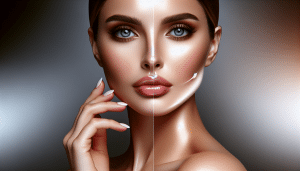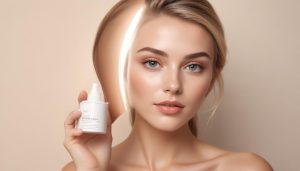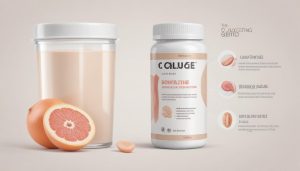Secrets You Never Knew About Collagen For Your Skin
Ella Knight August 24, 2025
Discover how collagen supports vibrant, youthful skin and learn why it’s a hot topic in beauty and wellness. This guide explores the science, the best sources, and user-friendly strategies for maintaining healthy skin at every age.
Why Collagen Matters More Than You Think
Collagen plays a starring role in skin health, strength, and resilience. It’s the structural protein keeping skin supple and elastic. Collagen production naturally decreases as people age, but lifestyle and wellness choices can influence this process. Understanding the importance of collagen in wellness and beauty routines helps explain its high demand in skincare discussions worldwide. As skin ages, the visible effects—wrinkles, dryness, and reduced flexibility—often result from declining collagen levels. By focusing on strategies to nurture collagen, many seek improved appearance and boosted confidence.
Current beauty trends highlight collagen for its visible and long-term impact on skin’s youthful appearance. Brands, influencers, and even dermatologists talk about collagen’s role in maintaining a radiant complexion. Wellness routines now feature collagen boosters via nutrition, supplements, and high-tech skincare. People often ask if topical collagen or ingestible powders deliver real results, with research suggesting that diet and overall healthy habits are equally crucial for supporting the body’s own natural collagen production. Staying informed helps users choose what fits their needs.
Interest in collagen has shifted from niche to mainstream because of emerging research on its multi-faceted effects—not just on skin, but also on nails, hair, and joint mobility. Social platforms, beauty forums, and health guides now point to collagen as an important ingredient in holistic self-care. For those seeking to maintain youthful skin and elasticity, exploring the intersection of diet, sleep, sun protection, and skincare can set a foundation for naturally supporting collagen. This approach leverages both timeless beauty wisdom and new science.
What Affects Collagen Production In Your Skin
Sun exposure remains one of the primary culprits behind early collagen breakdown. Ultraviolet (UV) rays penetrate skin and trigger enzymes that degrade collagen fibers. Skincare experts advocate for regular, broad-spectrum sunscreen—even on cloudy days—to help protect this precious protein. Living in sunnier climates or enjoying outdoor sports? Consistent protection becomes your first line of defense for long-term skin health and collagen preservation. Modern suncare products make it easier than ever to integrate this step into any daily routine.
Nutrition can be an unsung hero for collagen health. Diets rich in antioxidants—think berries, leafy greens, and beans—help neutralize free radicals that otherwise harm collagen structures. Amino acids found in protein-rich foods like fish, eggs, and legumes provide building blocks for new collagen. Vitamin C, found in citrus fruits and peppers, is essential for collagen synthesis and repair. Simple dietary shifts may offer meaningful benefits, and many experts recommend focusing on these everyday nutrients to support skin from the inside out.
Environmental stressors like smoking and pollution have also been linked to lower collagen production. Cigarette smoke, in particular, releases toxins that accelerate the degradation of skin proteins, contributing to premature wrinkles and loss of firmness. Airborne pollutants are known to increase inflammation and oxidative stress, further challenging skin resilience. Lifestyle modifications—such as quitting smoking and minimizing exposure to polluted environments—are actionable strategies anyone can adopt to maintain healthy collagen. These choices reflect a commitment not just to wellness but to overall longevity.
Collagen Supplements: Fact vs. Hype
Collagen supplements surge in popularity across beauty aisles and nutrition stores. Many people are curious: do powders, pills, or drinks truly improve skin appearance or slow visible aging? These products promise benefits ranging from plumper skin to healthier hair and stronger nails. Clinical research is still evolving, yet some well-designed trials suggest modest improvements in skin hydration and elasticity, especially when combined with other healthy habits. It’s important to choose reputable products and check for tested ingredients rather than relying on miracle claims.
Not all collagen is created equal. Supplements come from different sources, most commonly marine, porcine, or bovine origins. Marine collagen, derived from fish, is often noted for high absorption rates. Bovine options, made from cows, have a similar amino acid profile to human collagen. Deciding among these comes down to personal preference, dietary restrictions, and verified ingredient sourcing. Experts recommend consulting nutritionists or dermatologists before adding a new supplement to daily routines—this ensures compatibility with existing wellness goals and reduces risk of side effects.
Transparency is key when considering any supplement. The Food and Drug Administration (FDA) does not regulate collagen supplements as strictly as prescription treatments, so consumers should pay close attention to third-party testing or certifications. Reading ingredient lists for fillers, sweeteners, or allergens can avert unwanted reactions. Trusted health organizations often suggest starting with dietary strategies and then evaluating if a supplement brings noticeable changes. For many, this dual approach aligns best with evidence-based wellness and beauty care.
Natural Ways To Boost Collagen Every Day
Small daily routines can reinforce skin’s collagen framework. Regular facial massages, for example, are thought to increase local blood flow and stimulate cellular activity, giving skin a revitalized appearance. Nightly application of retinoids—vitamin A derivatives—has been well-studied for their ability to boost collagen production within deeper skin layers. When used carefully and with sun protection, retinoids can be a valuable addition to any anti-aging regimen. Paired with gentle cleansers and hydrating ingredients, skincare routines become a cornerstone of beauty and self-care.
Sleep and stress management matter more than many realize. Quality rest each night allows the body to repair and regenerate, including the rebuilding of collagen. Chronic stress, on the other hand, elevates cortisol levels that can inhibit collagen formation and accelerate its breakdown. Mindfulness, meditation, and adequate relaxation could be surprisingly skin-friendly choices. Prioritizing healthy sleep and seeking out regular moments of calm often translate to noticeable improvements in skin texture and radiance.
Staying hydrated is frequently overlooked, yet water is fundamental to skin health. Well-hydrated skin cells better maintain their shape and function, supporting the natural matrix of collagen and elastin. Many nutritionists recommend drinking water consistently throughout the day and enjoying water-rich foods—think cucumber, celery, and melons. Creating rituals around hydration, such as herbal teas or infused waters, can also encourage consistent self-care, inside and out. This holistic mindset blends science and simplicity for lasting wellness and beauty results.
Breaking Down Beauty Myths Around Collagen
Some beauty myths persist despite updated research. For instance, applying collagen-rich creams on the skin surface will not directly replace lost collagen. While these products can boost superficial hydration and create a smoothing effect, collagen molecules are generally too large to penetrate deep skin layers. Skincare fans may see an initial glow, but the scientific consensus is that boosting natural collagen from within remains most effective for lasting benefits. Understanding these nuances helps set realistic beauty expectations.
Another myth: only expensive or luxury collagen options work. The truth is, effective collagen support doesn’t always require a big investment. Balanced diets, daily habits, and practical skincare steps offer real value—often with a lower price tag. Subtle, cumulative efforts tend to create the best long-term effects for skin vitality and firmness.
Genetics certainly influence collagen destiny, but environmental factors and lifestyle play significant supporting roles. Even those with a family history of early wrinkles or skin sagging can optimize their beauty outcomes by focusing on daily sun protection, healthy eating, and non-smoking. Embracing a positive, informed approach means everyone can have some influence over their skin’s natural aging journey, no matter what’s written in their DNA.
Collagen’s Whole-Body Impact Beyond Beauty
Collagen’s benefits go beyond skin deep. Joints, tendons, and bones rely on robust collagen networks for smooth movement and resistance to wear and tear. Recent health guides emphasize collagen’s role in everything from mobility and athletic recovery to dental and gut wellness. People involved in sports, fitness, or physical work often seek out strategies to preserve or enhance their collagen reserves for performance and protection. Whole-body wellbeing aligns perfectly with today’s holistic beauty mindset.
Emerging research suggests that regular, collagen-conscious habits could support cardiovascular health. Certain forms of collagen appear favorable for artery elasticity and blood vessel function. While studies continue, experts recommend focusing on a balanced lifestyle—plenty of nutrient-rich foods, physical activity, and mindful stress management—as foundational for both wellness and beauty. Collaboration between dermatology and nutrition disciplines continues to uncover more about the complex benefits of collagen.
Nail and hair strength are also closely tied to collagen integrity. Weak, brittle nails or thinning hair may be early signs that the body’s collagen stores need attention. Focusing on holistic health strategies—beyond topical beauty solutions—helps support visible changes from the inside out. Consistent wellness routines empower individuals to invest in themselves while enjoying a radiant look as a positive byproduct.
References
1. Harvard T.H. Chan School of Public Health. (2023). Collagen. Retrieved from https://www.hsph.harvard.edu/nutritionsource/collagen/
2. Mayo Clinic. (2022). Collagen: What it is, types, and uses. Retrieved from https://www.mayoclinic.org/healthy-lifestyle/nutrition-and-healthy-eating/expert-answers/collagen/faq-20419377
3. Cleveland Clinic. (2022). Collagen: What it is, benefits, and more. Retrieved from https://health.clevelandclinic.org/what-is-collagen/
4. The American Academy of Dermatology Association. (2023). How to take care of your skin. Retrieved from https://www.aad.org/public/everyday-care/skin-care-basics/care/skin-care-tips-dermatologists
5. National Institutes of Health. (2021). Collagen supplementation and skin health. Retrieved from https://ods.od.nih.gov/factsheets/Collagen-Consumer/
6. Linus Pauling Institute at Oregon State University. (2023). Vitamin C and skin health. Retrieved from https://lpi.oregonstate.edu/mic/health-disease/skin-health/vitamin-c







